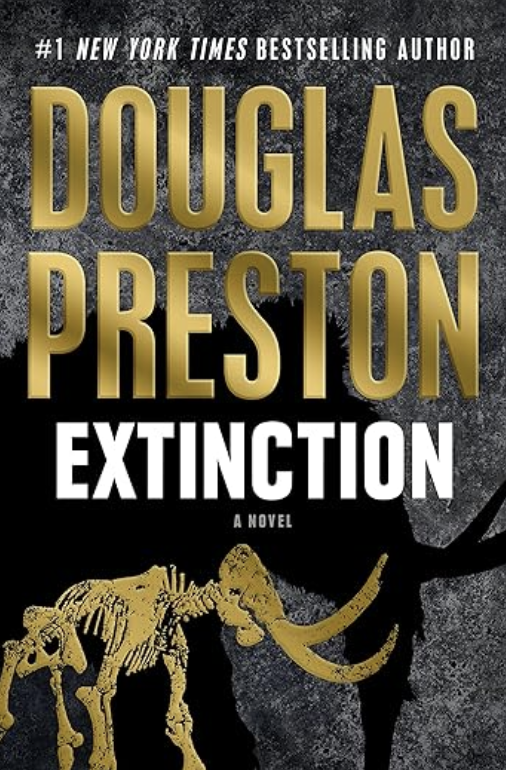Review of Extinction: A Novel* by Douglas Preston
Douglas Preston, a master of thriller fiction, continues to enthrall readers with his latest offering, *Extinction*. In this gripping novel, Preston delves into the realms of science, history, and the human psyche, weaving a tale that raises questions about survival, morality, and the fine line between ingenuity and recklessness. In this review, we will explore the primary themes, character development, and the overarching narrative that makes *Extinction* a compelling read.
Plot Overview
*Extinction* follows the story of an expedition led by Bill Smithback, a seasoned journalist, and his companion, renowned scientist Dr. Laura Hayward. The duo embarks on a journey to uncover the truth behind a series of inexplicable events connected to an ancient species thought to be extinct. Preston’s knack for blending real-life scientific concepts with fiction shines as he introduces the concept of genetic resurrection—the ability to revive species from extinction through advanced genetic engineering.The narrative unfolds at a brisk pace, showcasing Preston’s signature style of embedding rich detail and suspense. As the plot thickens, the characters find themselves in a race against time, facing not only external threats but also their internal struggles. The stakes escalate as they confront the moral implications of their scientific pursuits, prompting readers to question the extent to which humanity should go in the name of progress.
Character Development
Preston’s characters are multidimensional, each with their own motivations and ethical dilemmas. Bill Smithback serves as the voice of reason amid chaos, often reflecting on the consequences of humanity’s actions. His character evokes a sense of empathy as readers witness his growth and evolution throughout the novel. Dr. Laura Hayward, on the other hand, embodies the archetype of the ambitious scientist, pushing the boundaries of what is scientifically possible while grappling with her own moral compass.The dynamic between Smithback and Hayward adds depth to the narrative, as they navigate not only the physical dangers of their expedition but also the philosophical questions surrounding their findings. This interplay between characters creates a rich tapestry of human emotion and conflict, elevating the story beyond mere entertainment.
Themes of Morality and Innovation
At its core, *Extinction* poses significant ethical questions regarding scientific exploration and the consequences of playing God. The resurrection of extinct species raises concerns about ecological balance and the potential for unforeseen repercussions. Preston adeptly uses his platform to delve into the implications of genetic manipulation, reflecting ongoing debates within the scientific community regarding biotechnology and conservation.These themes resonate deeply in today’s world, where advancements in genetic science often outpace our ethical understanding. Researchers have pioneered techniques such as CRISPR, which allows precise DNA editing (Doudna & Charpentier, 2014). The novel serves as a cautionary tale, mirroring real-life discussions on the responsibilities of scientists and the societal impact of their work (Harris, 2016).
Scientific Underpinnings
Preston’s ability to ground his narratives in scientific reality sets him apart from his contemporaries. In *Extinction*, he showcases extensive research on genetics and extinct species, lending authenticity to the plot. The novel references real-world efforts to revive species like the woolly mammoth and the passenger pigeon (Schwartz et al., 2016). By weaving factual elements into his story, Preston captivates his audience while educating them on the complexities of extinction and conservation.The author’s meticulous attention to detail is evident as he explores the repercussions of reintroducing an extinct species into a modern ecosystem. This element of the story invites readers to contemplate not only the wonders of scientific discovery but also the potential risks involved. As Preston intertwines fictional narratives with scientific realities, he elevates the discourse surrounding biodiversity and environmental preservation (Pimm & Raven, 2000).
The Evolving Landscape of Thrillers
*Extinction* exemplifies the evolution of the thriller genre, merging elements of science fiction, mystery, and adventure. Preston’s ability to maintain suspense while delving into complex themes resonates with contemporary audiences who seek depth beyond traditional plot mechanics. The pacing is relentless, with cliffhangers that keep readers on the edge of their seats, highlighting Preston’s skill as a storyteller.Moreover, the book’s structure, interspersed with flashbacks and multiple perspectives, enriches the reading experience. This narrative technique allows readers to engage with the characters’ backstories and motivations, further enhancing the emotional weight of the story. Preston’s adept handling of narrative devices showcases his growth as a writer and his commitment to creating an immersive reading experience.
Conclusion
Douglas Preston’s *Extinction is a powerful exploration of the interplay between science and morality, set against a backdrop of thrilling adventure. The characters’ struggles with their ambitions, the ethical questions surrounding genetic resurrection, and the rich scientific context make for a multifaceted narrative that resonates with readers on many levels. As we grapple with our own responsibilities toward the environment and the species we share it with, Preston’s novel serves as both an exhilarating tale and a poignant reminder of the fragile balance of life on Earth.In a world where the line between innovation and ethical responsibility continues to blur, Extinction stands as a timely reflection of our reality. Whether you are an aficionado of thrillers or a casual reader, this novel promises a captivating journey that will linger in your thoughts long after the last page is turned.
References
1. Doudna, J.A., & Charpentier, E. (2014). The new frontier of genome engineering with CRISPR-Cas9. *Science*, 346(6213), 1258096.
- Harris, J. (2016). The ethics of genetic modification: from controversy to consensus. Journal of Medical Ethics, 42(4), 237-238.
- Pimm, S.L., & Raven, P. (2000). Biodiversity: Extinction by numbers. Nature, 403(6772), 843-845.
- Schwartz, M.W., et al. (2016). The role of science in species recovery: A review of the current status of rewilding. Conservation Biology, 30(5), 1027-1035.

